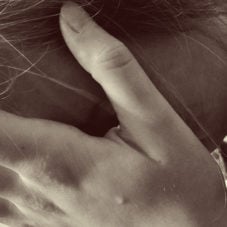It’s alarming to look in the mirror one day and realize you’re seeing more of your scalp. Hair extensions, wigs, and other hairstyling hacks can only do so much to hide thinning hair. But fret no more! In this blog post, we’ll share tips on how to get thicker hair naturally. Here’s a quick clue: our Collagen Peptides and Omega-3 Fish Oil are popular products for hair and skin health!
Table of Contents
How to tell if your hair is thinning?
You can usually tell when something’s amiss with your hair. You may notice a lot more hair falling daily, or your ponytail isn’t as thick as it used to be. That said, here’s a more definitive way to measure your hair for thickness (1):
Hair strand thickness
Compare a hair strand (preferably from the crown where it’s thickest) to a standard sewing thread. If hair diameter is about the same as the thread, you’ve got thick hair. Otherwise, you’ve got thin hair.
Hair density thickness
Hair density can be measured by how thick your ponytail’s circumference is. Here’s a guide:
- Less than 2 inches – thin or low density hair
- 2 to 3 inches – medium density hair
- 4 inches or more – high density
For short hair, you can tell if it’s thinning if your hair part appears wider than before. Or there is a lot more distance between hair strands.
Is hair thinning the same as hair loss?
No, hair thinning isn’t the same as hair loss.
Hair thinning occurs when individual strands become noticeably thinner and finer than usual, i.e. the hair diameter shrinks. This results in a more visible and sparser-looking scalp, but not necessarily bald spots. Hair thinning is a gradual process that only becomes apparent when hair density is significantly reduced.
On the other hand, hair loss is when you see clumps of hair falling out every time you shower or comb. It’s normal to lose about 100 strands daily. But when you see your shower drain full of hair, it’s a different feeling. It’s really quite alarming. You’ll instinctively know something’s not right, especially if it goes on for weeks and you start seeing bald spots!
Hair thinning in men vs women
Hair thinning and hair loss can affect both men and women. However, there’s a distinct difference.
In men, hair thinning and male pattern hair loss start early. Some experience it in their late teens, others in their late 20s or 30s. By age 50, however, a majority of men (about 85%!) will have significantly thinner hair and a receding hairline (2).
Women, on the other hand, can enjoy their gorgeous locks until they reach their golden years. Well, some women, that is. Unfortunately, many do experience hair thinning, especially when they reach middle age.
But unlike men, female hair thinning gradually occurs at the crown and the sides. A receding hairline is not common, but the sparseness and low density can become quite obvious post-menopause.
What are the hair vitamins that can help you get thicker hair?
Eating a balanced diet can help ensure your body gets all the nutrients it needs – but we know that’s easier said than done! So, if you find your mane starting to get lackluster and thinner, these hair vitamins and supplements may help:
Omega-3

Omega-3 fish oil has plenty of scientifically-backed health benefits, including skin and hair health support.
In one study, women who took omega-3, omega-6, and antioxidants for 6 months reported improvements in hair thickness and density. They also reported less hair loss as the months went by (3).
Interestingly, an animal study demonstrated that DHA (an omega-3 fatty acid) promoted hair growth like Minoxidil does (4)! Minoxidil is a drug used to stimulate hair growth.
For high-quality triglyceride fish oil, check out our Ultra Pure Omega-3. Each serving contains 2,250mg of omega-3 fatty acids in the clinically recognized 3:2 EPA:DHA ratio.
B complex vitamins and dietary minerals
Biotin may be the best known B-vitamin for hair and skin health. But all the other B vitamins contribute in one way or another.
For example, riboflavin, folic acid, vitamin B6, and vitamin B12 do their share by helping with red blood cell formation to help carry oxygen to hair.
Dietary minerals like iron, zinc, and selenium also help turn frazzled locks into radiant tresses!
You can get all these nutrients from food. But if you don’t have time to cook healthy meals all the time, a high-quality multivitamin can help supplement your diet.
Collagen

Collagen is the main protein responsible for building our hair, skin, nails, muscles, bones, cartilage, and tendons. Adding more collagen to your diet may help get thicker hair naturally!
Here’s how to make collagen-rich bone broth if you want to make it from scratch.
Need a quick collagen fix? Our Collagen Peptides supplement can help! It contains the amino acids that help build the keratin in hair and strengthen the scalp.
We use types I and III hydrolyzed bovine collagen, so the body more readily absorbs it. A once-daily scoop mixed into your favorite drinks or soups will help replenish your collagen stores.
Vitamin C
Vitamin C is well-known as an antioxidant and immune system booster.
But it’s also one of the key contributors to hair health. How? Well, vitamin C is a co-factor in collagen production, meaning the body can’t make collagen without vitamin C!
The most common form of vitamin C is called ascorbic acid. However, this form is easily destroyed by heat, light, and air. As such, choosing the right form of vitamin C is important so it doesn’t end up as waste, i.e. pee.
Vitamin A
Vitamin A may best be associated with eye health, but did you know it also helps with the health of all cells and tissues in the body? This means it’s also vital for hair and follicular health, and may help you grow thicker hair naturally.
Vitamin A also contributes to sebum production. This oily, waxy substance keeps our hair moisturized and naturally shiny. But take note that vitamin A is stored in the body, so it’s best to get this from food to avoid accidentally overdosing. Unfortunately, too much vitamin A can cause hair loss.
What are some of the causes behind thinning hair?
Before we discuss the most common factors that can influence hair thinning and hair loss in both men and women, it’s important to mention the 3 phases of the hair growth cycle:
- Phase 1 – anagen or hair growth phase. This phase can go on for several years.
- Phase 2 – catagen or transition phase. The hair strand has stopped growing and is preparing to shed. May last for weeks.
- Phase 3 – telogen or resting phase. The hair strand sheds, with no new hair growth to replace it. The hair follicle may stay dormant for weeks or months.
Here are some of the causes behind thinning hair:
Genetics
Both men and women can inherit the pattern baldness gene. However, it’s more prevalent in men. For women, the symptoms of female pattern hair loss may or may not appear. But there’s always the possibility of passing the gene to their offspring.
Age
As with most things in life, hair is also not immune to the aging process. Hair turns gray. Hair growth slows down. Even those lucky enough to avoid hair loss may see their once-thick hair eventually become thin and extra fine.
Pregnancy
Pregnancy can wreak havoc on female hormones. Many women experience fuller hair (increased hair density) during pregnancy. This may be due to higher estrogen levels. However, this spike is temporary. A few weeks after giving birth, estrogen levels go back down, resulting in hair thinning and hair loss in new moms. Fortunately, this isn’t permanent and hair health should be back to normal by the baby’s first birthday!
Stress
When you’re under stress for a prolonged period, more hair follicles go into the catagen and telogen phases. This means less hair growth, more hair shedding, and no new hair growing to replace the fallen hair.
Restrictive diet
Going on a restrictive diet that’s vastly different from what you’re currently on can put a lot of stress on your body, including your hair. This is especially true for diets that cut off certain food groups, leaving you at risk of nutritional deficiencies.
Conclusion
Thinning hair and hair loss are good indicators that something’s going on in our bodies. Hair restoration technology may help, but they’re expensive procedures. While the hair nutrients we’ve listed in this article may help you get thicker hair naturally, do consult a medical professional to see which product is best for your needs!
💬 Something on your mind? Share your thoughts in the comments. We love hearing from curious minds.
📩 And while you’re here, join our newsletter for more smart stuff (and secret perks)!
References
(1) Hair Density vs Hair Thickness | How to Tell the Difference and Measure Your Hair, from: https://prose.com/blog/hair-thick-dense-difference.php
(2) Taken from: https://www.americanhairloss.org/men_hair_loss/introduction.html
(3) Le Floc’h C, Cheniti A, Connétable S, Piccardi N, Vincenzi C, Tosti A. Effect of a nutritional supplement on hair loss in women. J Cosmet Dermatol. 2015;14(1):76-82. doi:10.1111/jocd.12127
(4) Kang, Jung-Il, Hoon-Seok Yoon, Sung Min Kim, Jeong Eon Park, Yu Jae Hyun, Ara Ko, Yong-Seok Ahn, Young Sang Koh, Jin Won Hyun, Eun-Sook Yoo, and et al. 2018. “Mackerel-Derived Fermented Fish Oil Promotes Hair Growth by Anagen-Stimulating Pathways” International Journal of Molecular Sciences 19, no. 9: 2770.




